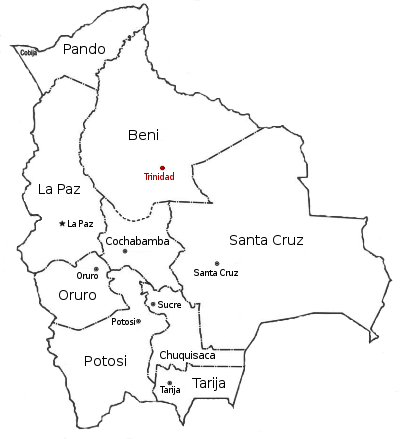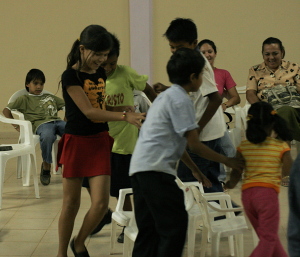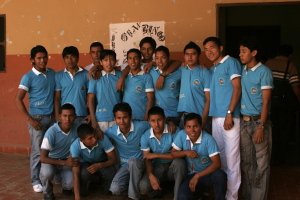Where
 |
We worked in the province of Beni, in the capital city of Trinidad. We flew into Santa Cruz, took an overnight bus through Beni, and arrived in Trinidad twelve hours later. Trinidad has periodic floods, and there is a ring around the city that doubles as highway and levy. The past two years have seen heavy flooding in the area. The area is quite poor. Bolivia is the poorest nation in South America, and while Beni is one of the wealthier eastern provinces, it is still quite poor. The part of Trinidad where the church my sub-team worked at probably qualifies as a slum; it was noticeably poorer than our hotel area. Bolivia has a history of political unrest; until the 1980s, there was a revolution on average more than once a year. Several years before we went, the eastern provinces had voted for “Autonomia, Si!”, that is, relative independence from the socialist-leaning Evo Morales central government. While we were there, they had protests in Santa Cruz which resulted in a couple deaths, and we left rather hastily on the last day as it appeared that they might be setting up road blocks, as people were burning things in the middle of the highway out of Trinidad. Several weeks after we left, the situation got so bad that American Airlines halted flights to Santa Cruz for about a week.
Despite this, however, the people are friendly and open. Centuries of Catholicism have done a lot of pre-evangelism: pretty much everyone believes that God exists, that Jesus is God, and that we have sinned and deserve punishment. Somehow, the meaning of Jesus’ death, that he was punished for our sins, instead of God punishing us, was not communicated. Many times all that is necessary for a person to become a follower of Christ is simply to be told. This is quite unlike many areas of the world, including the U.S., where many people are not convinced that God even exists, let alone that our sin is serious enough that someone has to die for it.
What we did
Sharing the Gospel
 |
| One of the families that
prayed to received Christ. (Plus Tatína from the church, holding one of the children, on the left) |
Training Believers
Although missions trips are usually about the missionaries doing the work, with e3, our main task was to was to train the Bolivian church members to do evangelism. We could do a lot of evangelism in a week, but after that, we are gone. The Bolivians, on the other hand, will always be there. So our task was to model evangelism and discipleship to the Bolivians and to train them to do likewise. We generally had different church members each day, so training was a little hard. Some had already been trained in the evangecube, so if they were willing, I had them share right away, otherwise I did it first a time or two. As we were walking to the next house I tried to give some pointers on things that might help them. Since we generally did not have anyone who had done discipleship, with us the previous day, I generally modeled the discipleship, but then spoke about the importance and purpose as we were walking to the next location.Evening Meetings
 |
| Musical chairs at one of the evening meetings. |
Discipleship
One of our goals was to follow up with people who accepted Christ and to disciple them. I generally gave a copy of the New Testament that we had, explained how to use it, mark and suggest that they read the gospel of John. I then went through the first couple questions of the discipleship sheet we had (a basic Bible study on salvation) in order to give them an idea of how to do it and to get practice looking up verses in the Bible. If we had nationals who felt comfortable, I had them do it (this only happened once, but she was really good). After a few questions, I left the sheet with them to do on their own time. Once in a while they had questions or concerns which we answered. One of the gals we visited had been told that she would sacrifice rewards in Heaven if she was not Catholic. This was kind of hard to answer, because I do not actually know official Catholic doctrine, but I pointed out verses that explained that salvation is believing that Jesus died for our sins and turning from them (Raul helped a lot here, too), and it seemed to answer her question.Discipleship was definitely an area I struggled with, because I did not really know what a new Christian needs to grow, and the discipleship material seemed really basic to me. Of course, just because it seems basic to me does not mean it is basic to everyone, though. My major struggle is probably knowing the principles of what they should be learning, and also the skill of being able to lead them there without just telling them.
Sharing in schools
 |
| This is the senior class Raul and I presented to |